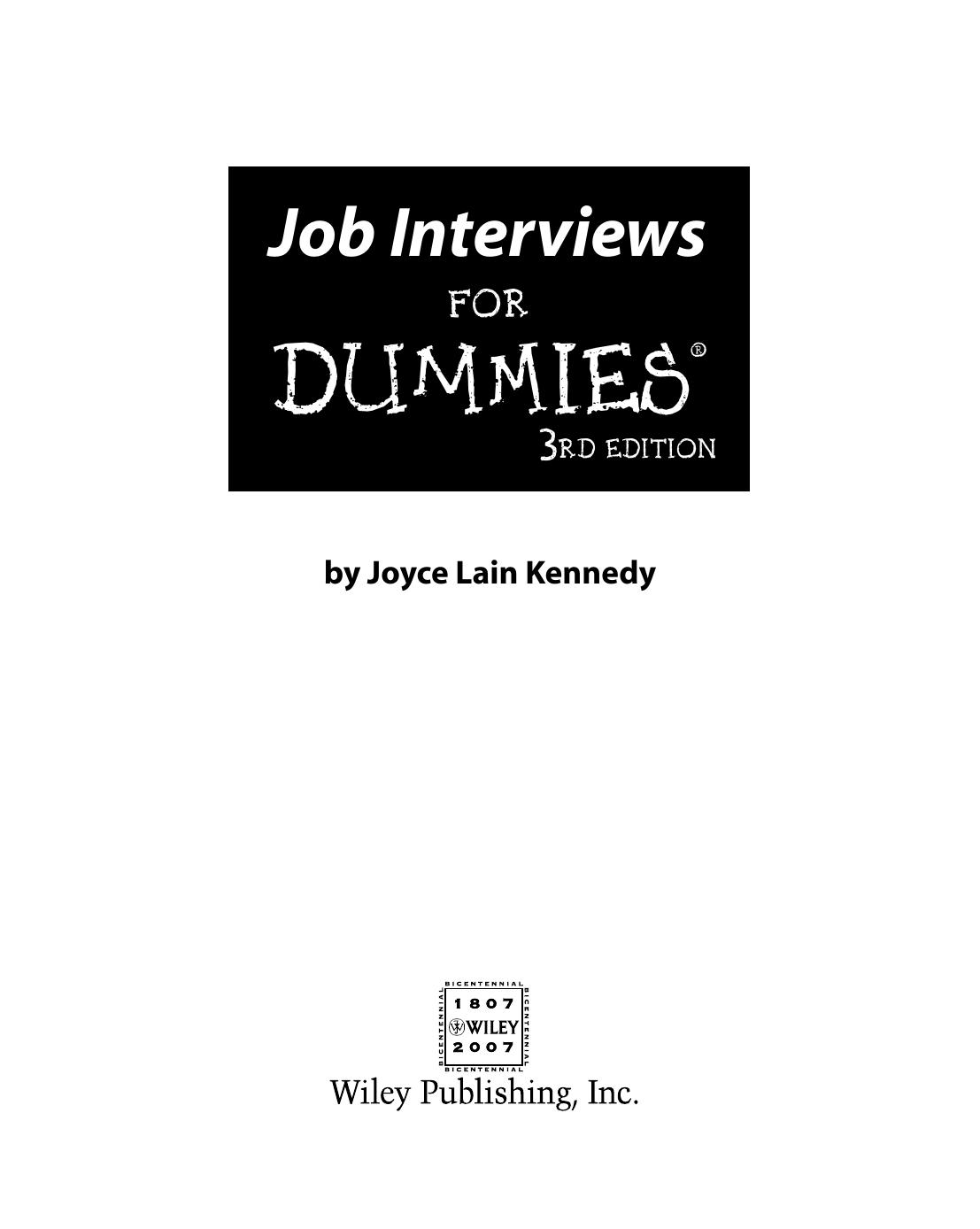Job Interviews For Dummies by Joyce Lain Kennedy

Author:Joyce Lain Kennedy
Language: eng
Format: epub, pdf
Publisher: Wiley
Published: 2011-11-22T16:00:00+00:00
Anticipating Interview Trapdoors
No matter how well youâre doing as you sail through an interview, certain things can throw you off balance when youâre not forewarned. Rehearse in your mind how you would handle the situations in the upcoming sections.
Disruptions
As you rehearse, keep in mind that not everything that happens during the interview is related to you. Your meeting may be interrupted by a ringing phone, the interviewerâs coworkers, or even the interviewerâs emergency needs. Add the factor of interview interference to your mock drills.
Because the show must go on, find language to politely overlook these interruptions with patient concentration. Practice keeping a tab on what youâre discussing between disruptions, in case the interviewer doesnât.
Silent treatment
Interviewers sometimes use silence strategically. Moments of silence are intended to get candidates to answer questions more fully â and even to get them to blurt out harmful information they had no intention of revealing.
Instead of concentrating on your discomfort during these silences, recognize the technique. Either wait out the silence until the interviewer speaks or fill it with a well-chosen question (see Chapter 11) that you have tucked up your sleeve. Donât bite on the silent treatment ploy, panic, and spill information that doesnât advance your cause. Donât run your mouth for no reason.
Turning the tables, you can use your own silence strategy to encourage the interviewer to elaborate or to show that youâre carefully considering issues under discussion.
Take One . . . Take Two . . . Take Three . . .
Practice your scenes until they feel right, until they feel spontaneous. Rehearsing gives you the power to become a confident communicator with the gift of presence. No more nervousness, no more zoning out. No more undercutting body language. Your butterflies fly in formation.
Tell me why I care
âSo what?â âWho cares?â âWhat good does your past accomplishment do me?â This kind of question may be unspoken, but itâs lying in ambush deep in every employerâs mind. Each time you mention a previous job duty or accomplishment, pretend the employer is really thinking, âWhat does this all mean for my benefit? Will it make money? Save money? Grow my companyâs market reach? What? Tell me why I care.â Rehearse telling me why I care and make the sale!
Download
Job Interviews For Dummies by Joyce Lain Kennedy.pdf
This site does not store any files on its server. We only index and link to content provided by other sites. Please contact the content providers to delete copyright contents if any and email us, we'll remove relevant links or contents immediately.
| Business School Guides | GMAT |
| Guides | Interviewing |
| Job Hunting | Job Markets & Advice |
| Resumes | Vocational Guidance |
| Volunteer Work |
The Motivation Myth by Jeff Haden(5190)
Audition by Ryu Murakami(4909)
Adulting by Kelly Williams Brown(4552)
The Confidence Code by Katty Kay(4236)
A Mind For Numbers: How to Excel at Math and Science (Even If You Flunked Algebra) by Barbara Oakley(3287)
Waiting in the Wings by Melissa Brayden(3205)
Self-Esteem by Matthew McKay & Patrick Fanning(3125)
Fooled by Randomness: The Hidden Role of Chance in Life and in the Markets by Nassim Nicholas Taleb(3091)
The ONE Thing by Gary Keller(3051)
Nice Girls Don't Get the Corner Office by Lois P. Frankel(3034)
The Dictionary of Body Language by Joe Navarro(2983)
How to be More Interesting by Edward De Bono(2778)
Designing Your Life by Bill Burnett(2719)
Getting Things Done by David Allen(2681)
The Plant Paradox by Dr. Steven R. Gundry M.D(2596)
Police Exams Prep 2018-2019 by Kaplan Test Prep(2527)
What Color Is Your Parachute? 2015 by Richard N. Bolles(2295)
Dangerous Personalities by Joe Navarro(2273)
When to Jump by Mike Lewis(2233)
